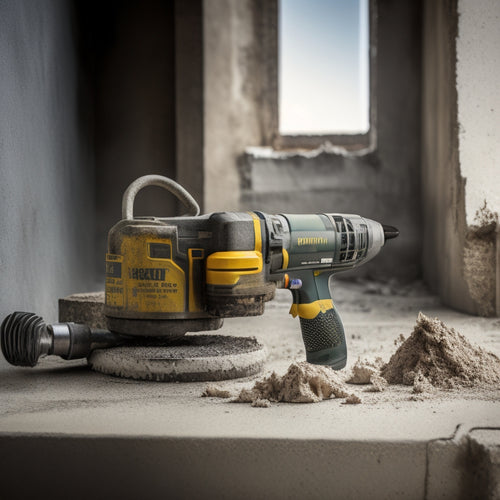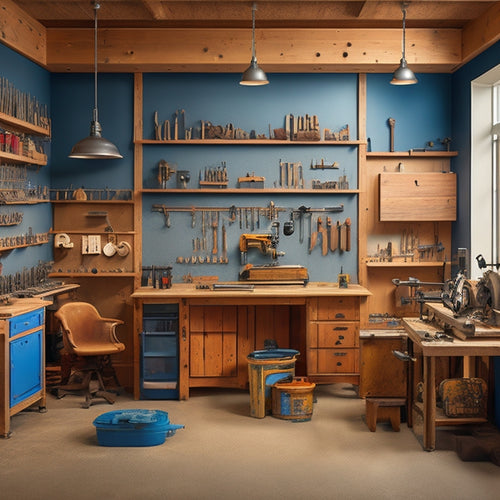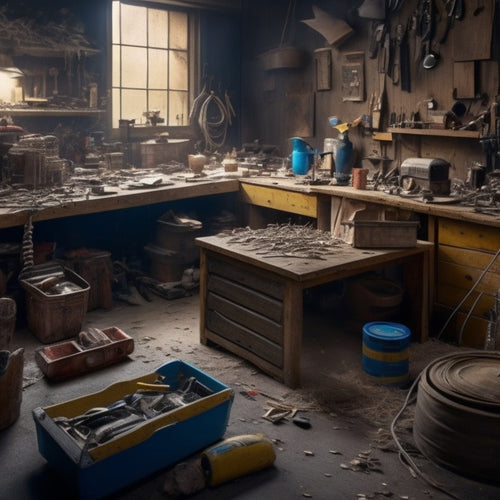
Must-Have Tools for Basement Renovation Success
Share
As you prepare to tackle your basement renovation, you'll need a solid arsenal of tools to guarantee success. Safety gear like goggles, dust masks, and hard hats are must-haves, along with demo tools like sledgehammers and reciprocating saws. For precision block work, you'll need a trowel, level, chisel, jointer, and hammer. Power tools like drill presses and circular saws will come in handy for heavy lifting, while measuring and marking tools will help you achieve accuracy. Don't forget specialized tools for finishing, mixing, and applying materials, as well as cleaning and organization tools to keep your workspace tidy. With these essentials at your disposal, you'll be well on your way to a successful basement renovation - and that's just the beginning.
Key Takeaways
• Essential safety gear, including goggles, dust masks, and hard hats, protects against hazards during basement renovation.
• Demolition tools, such as sledgehammers and reciprocating saws, are necessary for breaking down walls and removing debris.
• Hand tools, like trowels and chisels, are required for precision block work and ensuring a strong foundation.
• Power tools, including drill presses, circular saws, and impact drivers, increase efficiency and accuracy in heavy lifting tasks.
• Measuring and marking tools, such as tape measures and markers, are crucial for achieving professional-looking results and accurate installations.
Essential Safety Gear
When tackling a basement renovation, you'll need to gear up with essential safety equipment to protect yourself from potential hazards, including falling debris, electrical shock, and respiratory problems.
Safety goggles are a must-have to shield your eyes from flying particles and debris. You can opt for goggles with anti-fog coating to guarantee clear visibility.
Additionally, dust masks will help you breathe easy by filtering out airborne particles and dust. Look for masks with a HEPA filter or N95 rating for maximum protection.
Don't forget to wear a hard hat to protect your head from falling objects or collapsing structures. Steel-toed boots will safeguard your feet from heavy tools and materials.
A well-fitting pair of gloves will provide grip, protect your hands from cuts and abrasions, and improve your overall dexterity.
Tools Needed for Demolition
With your safety gear in place, you're ready to tackle the messy business of demolition, which requires a specific set of tools to get the job done efficiently and safely.
You'll need the right equipment to dismantle and remove existing structures, fixtures, and materials without causing damage or injury.
Here are the essential tools you'll need for demolition:
-
Sledgehammer: A heavy-duty hammer for breaking up concrete, tile, and other hard materials.
-
Demolition pry bar: A long, sturdy bar for prying apart walls, cabinets, and other structures.
-
Reciprocating saw: A versatile power tool for cutting through pipes, wires, and other obstacles.
- Debris removal tools: Heavy-duty trash bags, a wheelbarrow, or a dumpster for efficient debris disposal.
Hand Tools for Precision Block Work
Your precision block work requires a set of specialized hand tools that allow you to cut, shape, and fit blocks together seamlessly. These tools will help you master block alignment techniques and guarantee a sturdy foundation for your basement renovation. Here are the must-have hand tools for precision block work:
| Tool | Function |
|---|---|
| Trowel | Holds and applies mortar for block laying |
| Level | Guarantees blocks are straight and level |
| Chisel | Cuts and shapes blocks for fitting |
| Jointer | Finishes and smooths block joints |
| Hammer | Taps blocks into place and breaks up old mortar |
With these hand tools, you'll be able to achieve professional-looking results and avoid common mistakes. Remember to follow mortar mixing tips, such as using the right ratio of cement to sand, to guarantee a strong and durable bond between blocks. By investing in these essential hand tools and mastering their uses, you'll be well on your way to a successful basement renovation.
Power Tools for Heavy Lifting
As you tackle your basement renovation, you'll soon realize that power tools are essential for heavy lifting.
You'll need to make precise cuts, drive heavy fasteners, and drill through thick materials, which is where the right power tools come in.
Now, let's take a closer look at the must-have power tools for your project, starting with drill press essentials, circular saw mastery, and impact driver benefits.
Drill Press Essentials
You'll need a reliable drill press to tackle the heavy lifting in your basement renovation, particularly when working with thick or hardwood materials that require precise drilling and hole-making. A drill press is a versatile tool that offers more precision and control than a handheld drill, making it an essential investment for your project.
When selecting a drill press, consider the following essentials:
-
Drill press types: Choose between a benchtop or floor-standing model, depending on the space and scale of your project.
-
Motor power: Opt for a drill press with a powerful motor (at least 1/2 HP) to handle demanding tasks.
-
Speed control: Guarantee the drill press has variable speed control to accommodate different materials and drilling tasks.
- Drill press accessories: Invest in a set of high-quality drill bits and accessories, such as a drill press vise and mortising attachment, to expand the tool's capabilities.
Circular Saw Mastery
With the precision of a drill press behind you, it's time to bring heavy-duty cutting power to your basement renovation with a circular saw, a versatile and potent tool capable of slicing through lumber, plywood, and MDF with ease.
You'll need to choose the right type of circular saw for your project, whether it's a sidewinder, worm drive, or hypoid saw. Each type has its strengths, so consider the specific demands of your renovation.
To guarantee peak performance, regular circular saw maintenance is essential. Keep your saw blade clean and sharp, as a dull blade can lead to inaccurate cuts and increased risk of kickback.
Check and adjust the saw's alignment and bevel settings regularly, and always use the correct blade for the material you're cutting. Additionally, maintain a firm grip on the saw and keep your work area clear of debris to avoid accidents.
Impact Driver Benefits
Tackling heavy-duty fastening and loosening tasks in your basement renovation demands an impact driver, a power tool that packs incredible torque and speed to drive large screws and bolts effortlessly.
With an impact driver, you'll experience the advantages of faster completion times, reduced fatigue, and increased precision. This power tool is a game-changer for tasks that require heavy lifting, such as assembling furniture, installing drywall, or securing heavy fixtures.
Here are some key benefits of using an impact driver:
-
Increased torque: Impact drivers deliver more torque than traditional drills, making them ideal for heavy-duty tasks.
-
Faster completion times: With an impact driver, you'll complete tasks quickly and efficiently, saving you time and energy.
-
Reduced fatigue: The high torque and speed of an impact driver reduce the physical strain on your body, allowing you to work longer without fatigue.
- Easy maintenance: Impact drivers are relatively low-maintenance, requiring only regular cleaning and occasional lubrication to keep them running smoothly.
Measuring and Marking Tools
During the initial stages of your basement renovation, accurate measurements are essential, and that's where measuring and marking tools come into play.
You'll need to verify that your measurements are precise to avoid costly mistakes and delays. A high-quality tape measure is a must-have for this stage. Look for one with a sturdy hook, a clear and large display, and a long tape that can extend up to 25 feet. To verify tape measure accuracy, make sure to hold the tape level and taut, and take multiple readings to confirm your measurements.
When it comes to marking, you'll need a reliable marker that can make clear and visible marks on various surfaces. A fine-tip marker is ideal for marking precise lines and measurements, while a thicker marker is better suited for making bold marks on drywall or concrete.
Mastering marking techniques, such as using a straightedge to draw straight lines and making light, gentle marks to avoid marring surfaces, will also help you achieve professional-looking results.
Mixing and Applying Materials
When you're ready to start mixing and applying materials in your basement renovation, you'll need to make certain you have the right tools for the job.
You'll want to check off each item on your mixing essentials checklist to guarantee you're properly prepared.
Mixing Essentials Checklist
You'll need a mixing essentials checklist to guarantee you have all the necessary tools and materials to mix and apply adhesives, mortars, and other substances properly. This ensures that you're using the right materials and techniques to achieve a strong and durable bond.
When it comes to mixing, it's vital to take into account material compatibility to avoid any adverse reactions or weakening of the bond.
Here's a checklist of must-haves for mixing success:
-
Mixing buckets and paddles: Sturdy, clean buckets and paddles are essential for mixing materials to the right consistency.
-
Measuring cups and scales: Accurate measurements are critical when mixing materials, so make sure you have reliable measuring cups and scales.
-
Mixing sticks and trowels: These tools help you mix and apply materials efficiently, guaranteeing a smooth and even finish.
- Material safety data sheets (MSDS): Always have MSDS on hand to guarantee you're aware of any safety precautions and mixing techniques specific to the materials you're working with.
Applying Materials Safely
With your mixing essentials in place, it's time to focus on applying materials safely and efficiently, guaranteeing a successful basement renovation that meets your quality and timeline expectations.
When applying materials, it's essential to prioritize material safety to avoid accidents and maintain a healthy work environment. Always read and follow the manufacturer's instructions, and take necessary precautions such as wearing protective gear like gloves, goggles, and masks. Additionally, make certain the area is well-ventilated to prevent inhalation of harmful fumes.
Mastering application techniques is also critical to achieving professional-looking results. For instance, when applying adhesives or coatings, use the recommended application rate and spread it evenly to prevent uneven drying or bonding.
Work in small sections to maintain control and avoid messes. Use the right tools, such as rollers or brushes, designed for the specific material you're working with.
Specialized Tools for Finishing
Several specialized tools are essential for achieving a professional-looking finish in your basement renovation. As you work on adding the finishing touches, you'll want to guarantee you have the right equipment to get the job done efficiently and effectively.
Here are some must-have specialized tools for finishing:
-
Drywall sanding pole: A drywall sanding pole allows you to reach high ceilings and corners with ease, making it easier to smooth out drywall joints and achieve a flawless finish.
-
Pneumatic stapler: A pneumatic stapler is perfect for installing insulation, drywall, or flooring, saving you time and effort.
-
Caulk gun: A caulk gun is a must-have for sealing gaps and cracks around windows, doors, and trim, guaranteeing a watertight seal and a professional finish.
- Paint sprayer: A paint sprayer is ideal for painting large surfaces quickly and evenly, giving your basement a smooth, uniform finish.
With these specialized tools in your arsenal, you'll be able to tackle even the most demanding finishing tasks with confidence, guaranteeing your basement renovation turns out exactly as you envisioned.
Cleaning and Organization Tools
As you work on transforming your basement, regularly cleaning up debris and organizing your tools will save you time and reduce frustration. A clean and organized workspace helps you stay focused and avoid accidents. Invest in essential cleaning supplies like a vacuum, broom, dustpan, and mop to keep your basement floor clean. Don't forget to stock up on trash bags, gloves, and a first-aid kit.
To maintain organization, implement systems that work for you. Invest in a tool chest or pegboard to keep your tools within easy reach. Label each section or bin so you can quickly find what you need.
A cordless drill with a built-in level and a laser level will help you achieve precise measurements. Consider a portable workbench or sawhorses to create a stable workspace. Additionally, use storage bins and shelves to keep materials like drywall, lumber, and paint off the floor.
Frequently Asked Questions
Can I Renovate My Basement Without Professional Help?
You're considering taking on a basement renovation solo, but can you really do it without professional help?
It's possible, but you'll need to develop solid DIY strategies and carefully consider budget constraints.
Start by evaluating your skills and identifying areas where you might need guidance.
Create a detailed plan, prioritize tasks, and allocate funds wisely.
With careful planning and execution, you can successfully renovate your basement on your own, but be prepared to adapt to unexpected challenges that may arise.
How Do I Handle Asbestos or Lead During Renovation?
When handling asbestos or lead during your basement renovation, you'll need to take serious precautions.
First, consider hiring a pro for asbestos testing and lead removal, as DIY attempts can be dangerous.
If you do decide to tackle it yourself, wear protective gear, seal off the area, and use a HEPA vacuum.
Always follow local regulations and guidelines for disposal.
What Permits Are Required for a Basement Renovation?
You're finally ready to release your inner DIY rockstar on that basement renovation, but hold up, don't get too excited just yet!
You're gonna need to get permission from the authorities first. Yeah, we understand, permits are a real buzzkill.
But trust us, it's essential to guarantee your project meets building codes and passes the inspection process.
Research what permits are required in your area and get them before you start demo day - your wallet (and the law) will thank you.
How Do I Ensure Proper Ventilation in My Basement?
You'll want to guarantee proper ventilation in your basement to maintain good air quality.
Start by identifying sources of moisture, like water heaters or laundry areas, and install vents or fans to direct airflow outside.
Implement ventilation techniques like a heat recovery ventilation system or a dehumidifier to reduce humidity.
Don't forget to seal any gaps or cracks in walls and floors to prevent air leaks, and consider hiring a pro to inspect your ductwork for ideal airflow.
Should I Renovate My Basement in Stages or All at Once?
You're standing at the crossroads, wondering whether to tackle your basement renovation in one swift motion or break it down into manageable stages.
Think of it like a recipe: you can't skip the prep work and expect a masterpiece. Stage planning is key to avoiding costly mistakes and ensuring a smooth process.
Consider your budget considerations and prioritize tasks accordingly. By doing so, you'll be sipping champagne in your newly renovated basement in no time, minus the financial hangover.
Conclusion
You've made it to the final stretch of your basement renovation!
With these must-have tools in your arsenal, you'll be unstoppable - a renovation rockstar!
Don't even think about tackling the project without them, or you'll be stuck in a sea of DIY despair.
With these essentials, you'll be able to tackle even the toughest tasks with ease, transforming your basement from a dingy dungeon to a stunning oasis in no time.
Related Posts
-

Top Drill for Concrete Wall Renovation
When choosing the top drill for your concrete wall renovation, you'll want to prioritize key features like drill powe...
-

Renovation Tool Checklist for Smooth Finishes
When tackling a renovation project that requires a smooth finish, you'll need a thorough tool checklist to guarantee ...
-

Why Delay Your Renovation With Poor Tool Management
You're likely unaware that poor tool management is a leading cause of renovation delays, and it's not just about havi...


